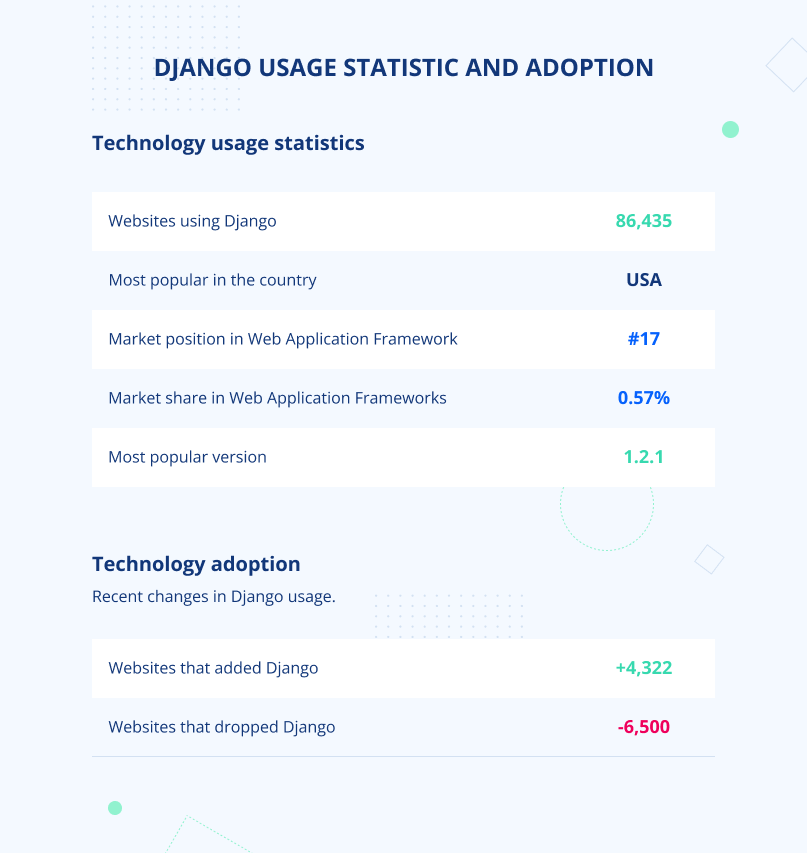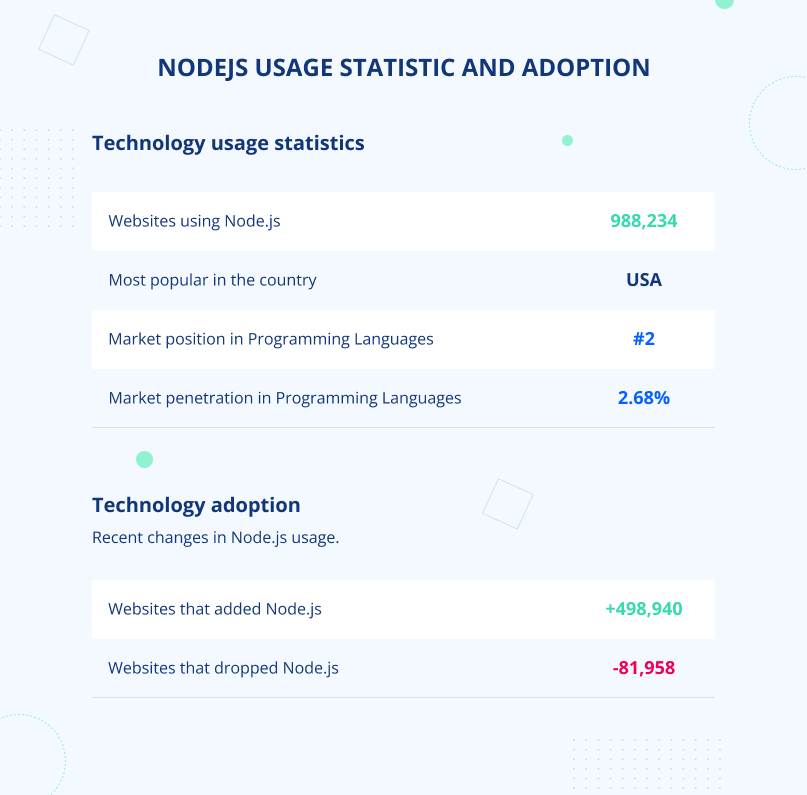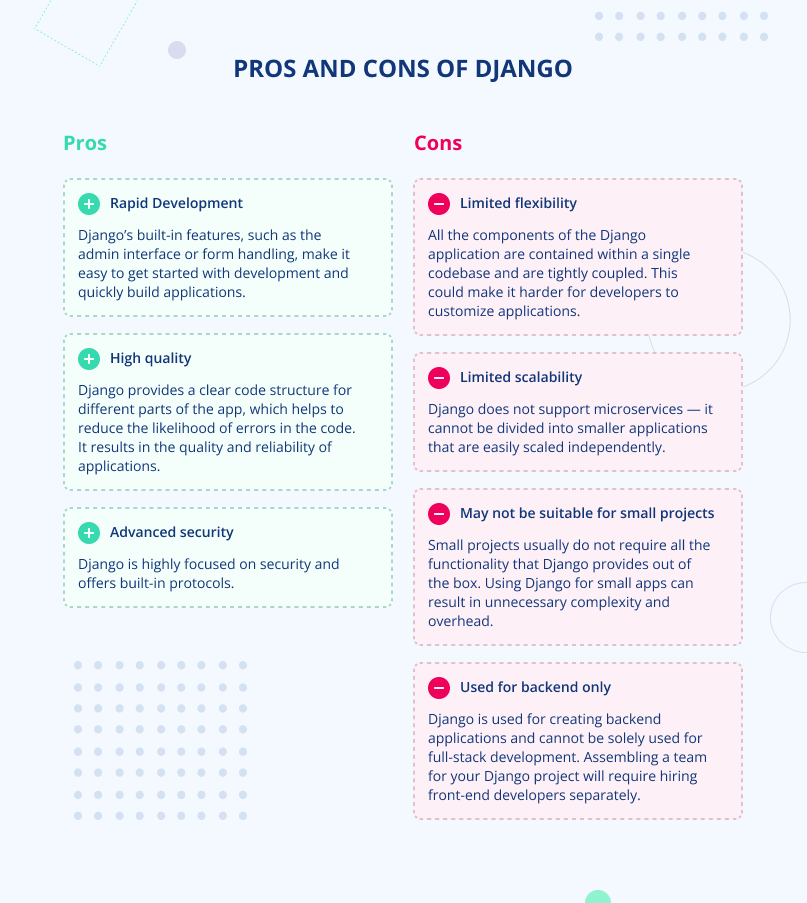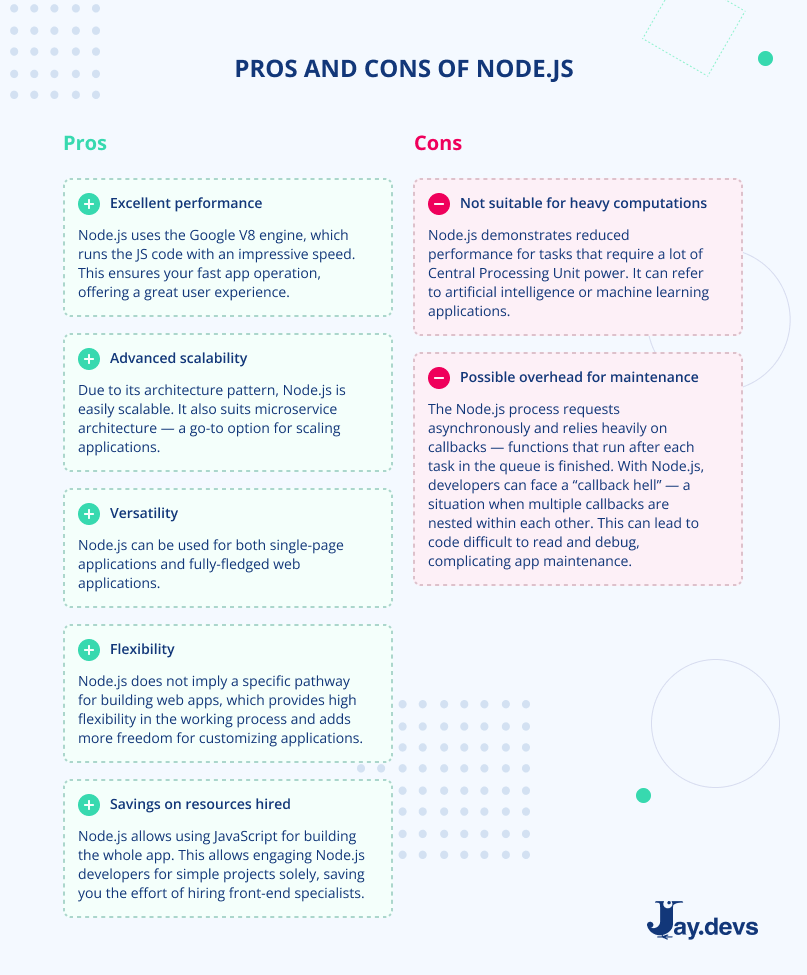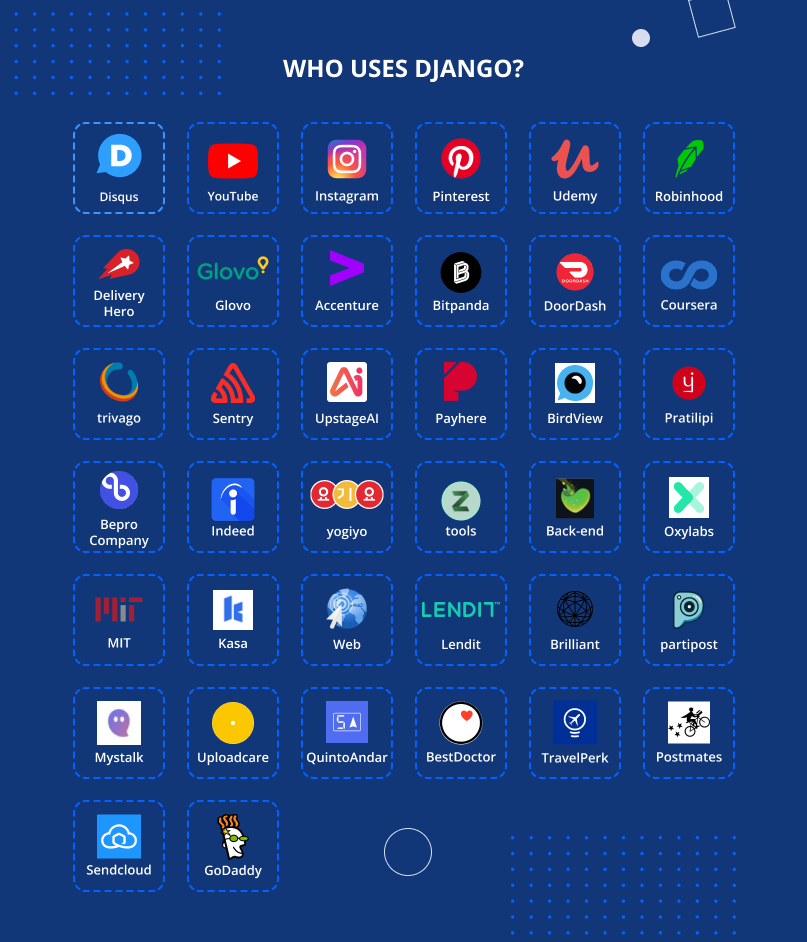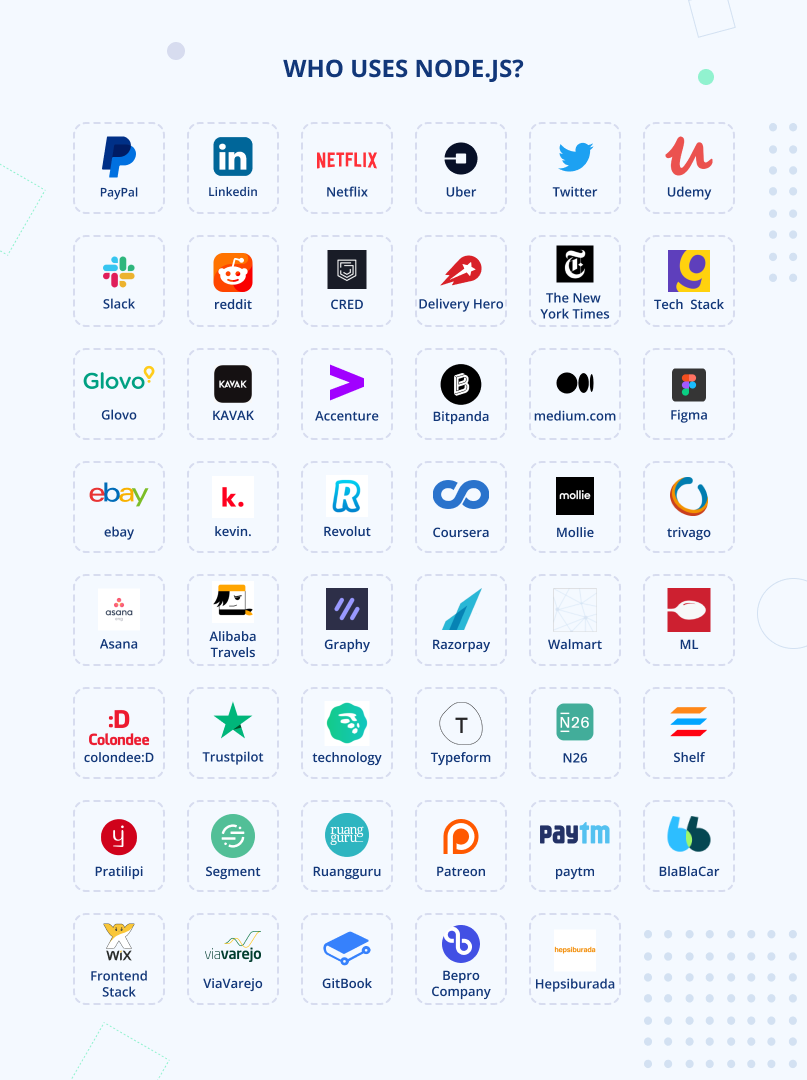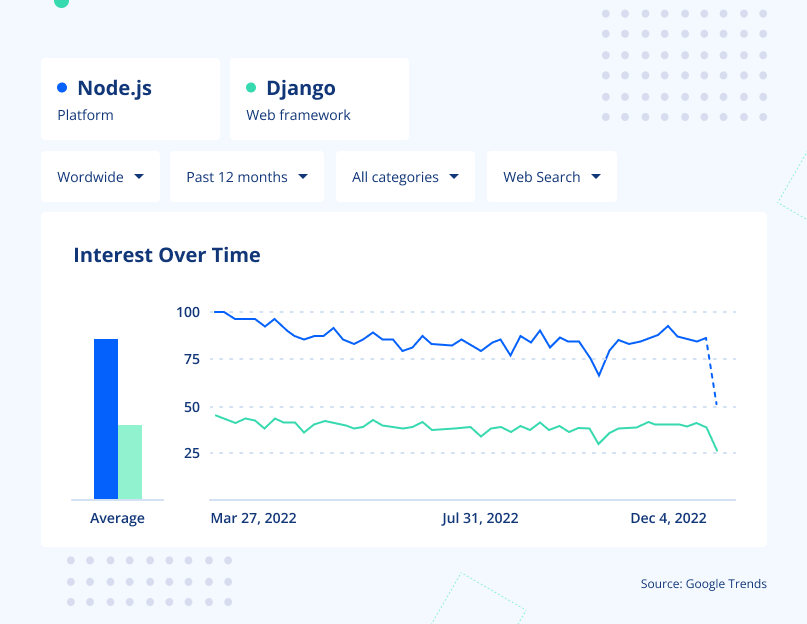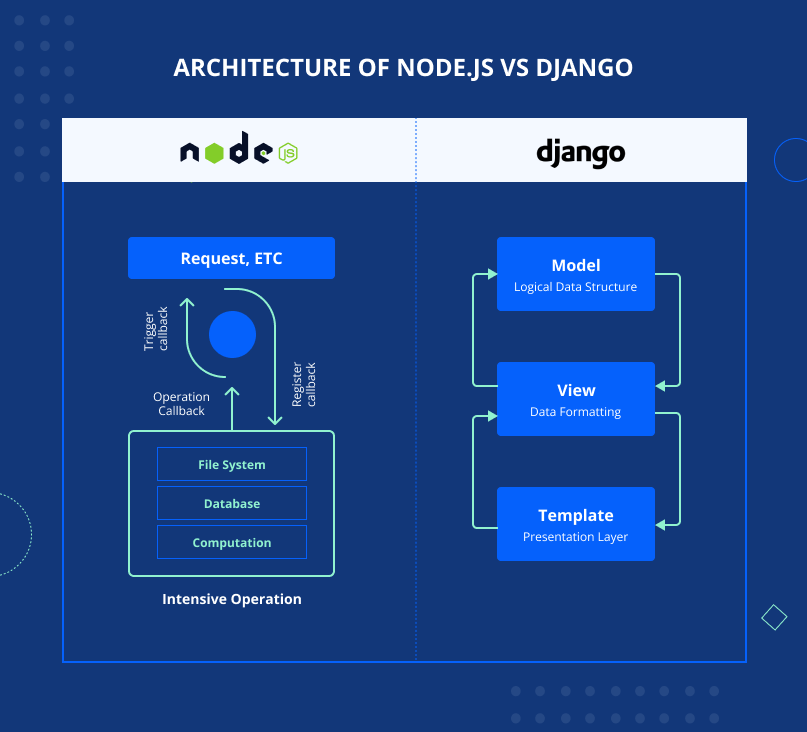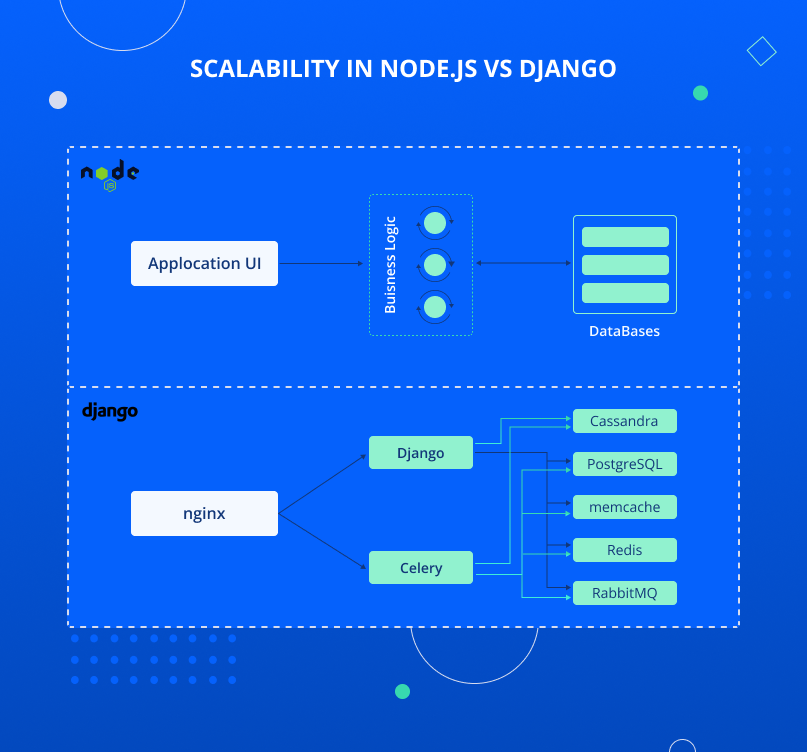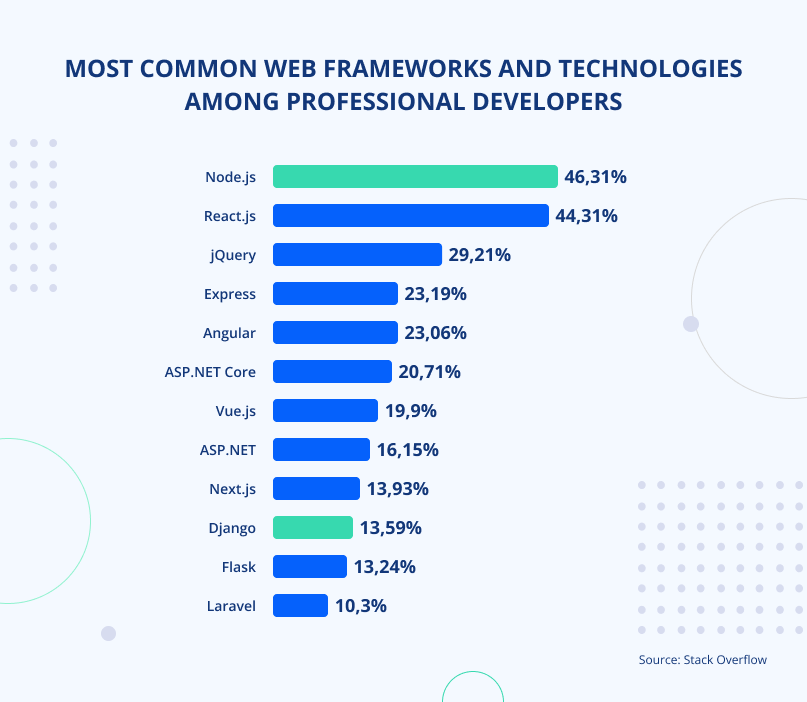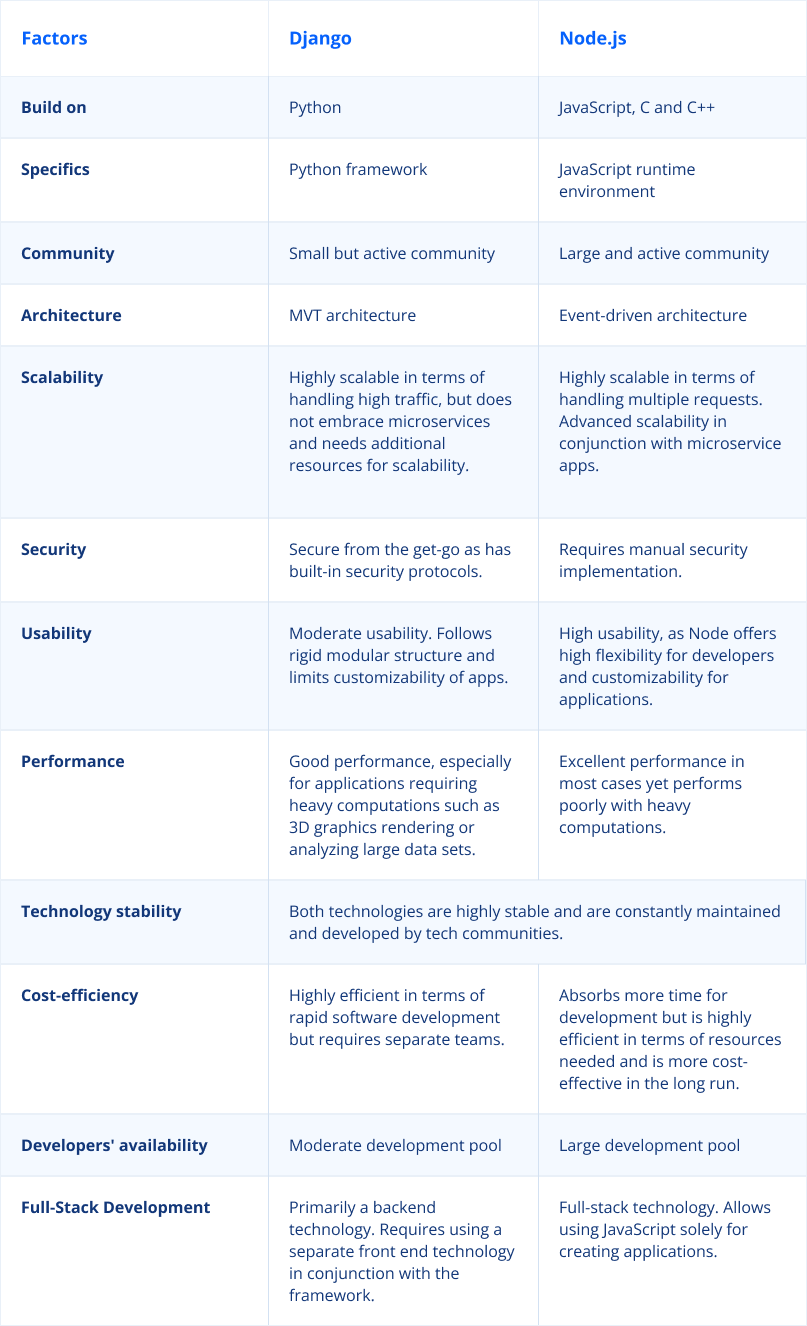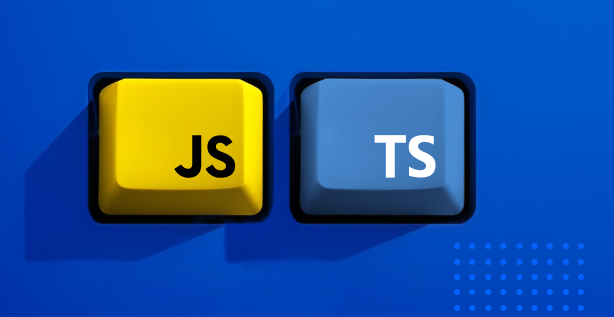It’s crucial for websites and web applications to have quick loading and an excellent user interface to engage and retain users. About 47% of website visitors expect a web page to load within two seconds or less. In addition to the page speed, your web application should be accessible to users 24/7, work stably, and be secure from cyber attacks.
All these crucial aspects depend on the backend structure of the app, which is hidden from the user. The backend or server side of an app directly influences its client side with which users interact. Thus, a slow or poorly performing backend can negatively affect the user experience.
To avoid these and other issues, you should pay special attention to choosing the right backend frameworks. There are over 15 backend frameworks used for web app development. Choosing the best-fit framework can be challenging because each has its peculiarities and specifics.
In this article, we’ll look into Django and Node.js — the most widely used backend frameworks for building web applications. Both technologies are well-respected in the development community and have a lot to offer in terms of performance, security, and stability.
We’ll provide an in-depth look at the Django vs Node.js debate, comparing their capabilities, strengths, and weaknesses. It will help you to make an informed decision and choose the right tool for your web development project.
- 1. A Brief About the Two Frameworks
- 2. What is the Django Framework?
- 3. What is Node.js Environment?
- 4. Why Node.js vs Django for Web Development?
- 5. Some Popular Companies Using Django
- 6. Some Popular Companies Using Node.js
- 7. Django vs NodeJS: Head-to-Head Comparison
- 8. What to Choose: Node.js or Django
- Conclusion
A Brief About the Two Frameworks
Both Django and NodeJS are suitable for building complex web applications but are based on different programming languages and have diverse specifics.
Django is a framework for web app development with Python. It provides a set of built-in tools for creating the backend of a web solution. These tools can be reused multiple times.
Node.js, on the other hand, is not a framework but a JavaScript runtime environment. It executes JavaScript code on the server side outside of a web browser. It allows the creation of web applications using one programming language for the back and front ends.
Django and Node.js are both open-source, meaning you don’t need to pay for any licenses to use them for web application development.
What is the Django Framework?
Django is a powerful Python web framework used for backend development.
It was created in the fall of 2003 by two web developers, Adrian Holovaty and Simon Willison, who built news websites with Python. After creating several of them, the team started to reuse a lot of common code and design patterns. This shared code evolved into the Django framework, publicly released in 2005. Now it is maintained by the non-profit Django Software Foundation.
The founders of the framework lay the “Don’t repeat yourself” principle as a basis for its usage. The framework allows developers to avoid writing the same code over and over but reuse it, reducing the overall software development time.
Additionally, Django follows the “batteries included” approach. It provides out-of-the-box solutions to complete the most common tasks, such as handling user authentication, database interactions, and more. In turn, this frees up the time to work on business logic and the UX/UI of an app.
Some core features of Django include:
- Built with Python, which is known for its simplicity and readability;
- Leverages a Model View Template architecture and separates the app into three parts: business logic, user interface, and layout. It helps developers keep their code organized and consistent and makes it easier to maintain and scale the application;
- Uses object-relational mapping (ORM) system to streamline database operations without writing additional SQL code. This makes it easier to work with databases and reduces the time for programming;
- Designed to handle large amounts of traffic, making Django well-suited for applications with a lot of users (social networks, e-commerce websites, education platforms, etc.);
- Is cross-platform so you can run Django-based apps on Windows, MacOS, and Linux.
What is Node.js Environment?
Node.js is a cross-platform runtime environment that allows the development of server applications using JavaScript.
From the very beginning, JavaScript was used to create the front end of websites and web apps. In 1996, Netscape launched a server-side JavaScript environment to utilize JavaScript for backend programming. The technology did not succeed due to poor performance. In 2009, software developer Ryan Dahl introduced the Node.js platform. It is based on the Google V8 engine which allows fast running of the JS code outside the browser. Currently, the technology is supported by the OpenJS foundation.
Node.js makes it possible to use “JavaScript everywhere” — for building the front end and back end of an app. It eliminates the need of using additional programming languages and streamlines web application development.
Some core features of Node.js include:
- Built on the V8 JavaScript engine, which provides fast page loading;
- Allows using JavaScript for the server and client sides. Building the backend and front end of an app using one programming language provides faster development and easier maintenance;
- Leverages an Event-driven architecture and processes multiple user-generated events simultaneously (mouse clicks, inputs from the keyboard, etc.). This makes Node.js well-suited for applications that require real-time, interactive user interfaces (live chats, online games, streaming platforms);
- Designed for creating applications of different complexity;
- Has a vast ecosystem of free libraries and tools updated regularly. This makes it easy for developers to add new features quickly;
- Similar to Django, it is cross-platform and can run on Linux, Windows, or MacOS operating systems.
Why Node.js vs Django for Web Development?
When choosing a technology for web development, there are many factors to consider, such as development speed, scalability, security, and more. This will help you to align your specific requirements with the possibilities provided by a certain technology and make a wise choice. Node JS vs Django are two widely used tools, yet each comes with advantages and drawbacks.
Pros of Django
- Rapid Development. Django’s built-in features, such as the admin interface or form handling, make it easy to get started with development and quickly build applications.
- High quality. Django provides a clear code structure for different parts of the app, which helps to reduce the likelihood of errors in the code. It results in the quality and reliability of applications.
- Advanced security. Django is highly focused on security and offers built-in protocols.
Cons of Django
- Limited flexibility. All the components of the Django application are contained within a single codebase and are tightly coupled. This could make it harder for developers to customize applications.
- Limited scalability. Django does not support microservices — it cannot be divided into smaller applications that are easily scaled independently.
- May not be suitable for small projects. Small projects usually do not require all the functionality that Django provides out of the box. Using Django for small apps can result in unnecessary complexity and overhead.
- Used for backend only. Django is used for creating backend applications and cannot be solely used for full-stack development. Assembling a team for your Django project will require hiring front-end developers separately.
Pros of Node.js
- Excellent performance. Node.js uses the Google V8 engine, which runs the JS code with an impressive speed. This ensures your fast app operation, offering a great user experience.
- Advanced scalability. Due to its architecture pattern, Node.js is easily scalable. It also suits microservice architecture — a go-to option for scaling applications.
- Versatility. Node.js can be used for both single-page applications and fully-fledged web applications.
- Flexibility. Node.js does not imply a specific pathway for building web apps, which provides high flexibility in the working process and adds more freedom for customizing applications.
- Savings on resources hired. Node.js allows using JavaScript for building the whole app. This allows engaging Node.js developers for simple projects solely, saving you the effort of hiring front-end specialists.
Cons of Node.js
- Not suitable for heavy computations. Node.js demonstrates reduced performance for tasks that require a lot of Central Processing Unit power. It can refer to artificial intelligence or machine learning applications.
- Possible overhead for maintenance. The Node.js process requests asynchronously and relies heavily on callbacks — functions that run after each task in the queue is finished. With Node.js, developers can face a “callback hell” — a situation when multiple callbacks are nested within each other. This can lead to code difficult to read and debug, complicating app maintenance.
Some Popular Companies Using the Django Framework
While comparing Django vs Node, it’s useful to look at real-world examples of how companies benefit from these technologies.
Django accelerates the development of complex and high-traffic applications and is used by world giants such as Disqus, YouTube, and Instagram.
Disqus
Disqus is a popular online commenting system with over 35 million active monthly users. The platform was initially built using the Django framework to create their solution rapidly with ready-to-go tools. Over time, the company was able to scale its platform with a combination of Django and Varnish, to handle 8 billion page views per month and 45k requests per second.
YouTube
YouTube was originally built using PHP. As the platform audience was growing rapidly, it required fast feature implementation. By adding Python and Django to its technology stack, YouTube benefited from quick releases offering new functionality. The platform has over 2 billion monthly active users now while Django helps to handle high traffic loads.
Instagram is the largest social network with over 1 billion monthly active users. Initially, the platform used Python and Django due to the “simplicity and practicality”. As the platform grew in popularity, it started to process more and more users’ data and interactions. With Django, the team was able to manage a huge database of users, ensuring the smooth operation of the app.
Some Popular Companies Using the Node JS Environment
Comparing the use cases of Django vs Node.js, the latter is widely used due to its capability to handle loads of real-time connections and events efficiently.
Node.js is used by enterprise companies among which are PayPal, Linkedin, and Netflix.
PayPal
PayPal is a popular online payment platform with about 429 million active users worldwide. It switched from Java to Node.js to make processing tons of real-time financial transactions fast and effective. The company also managed to unite the backend and frontend teams into a single unit and speed up the development.
LinkedIn opted for Node.js instead of Ruby on Rails to optimize its mobile app. Being a global networking platform with 900 million registered users, the application required fast real-time updates to provide a seamless experience for users. Node.js provided a Linkedin mobile app with more app speed and a reduced number of servers used.
Netflix
Netflix is the biggest video streaming provider with over 230 million subscribers. Until 2015 the app server side was running on Java, which poorly interacted with the JS client side causing slow loading time. Netflix successfully increased performance with Node, so that users can view content faster. It also streamlined the development given the only language needed — JavaScript.
Django vs. Node.js: Head-to-Head Comparison
Now that you know the basic specifics of Django and Node.js, the pros and cons of both technologies, and the benefits they brought to global companies, it’s time for an in-depth comparison of Django vs Node.js. It will help you to deeper understand what both technologies can offer for your project and answer the question: “Node or Django?”
Popularity
Django and Node.js both are in the global top ten of the most used web frameworks among developers.
Survey data from Statista shows that Node.js takes 1st place among web frameworks and is used by 47.12% of web developers worldwide. In contrast, Django is ranked 9th in the top ten and is used by 14,65% of surveyed specialists.
If we compare the amount of Django vs Node JS websites available on the internet, Node beats the figures again. According to Webtechsurvey, over 980 thousand live websites use Node.js and about 86 thousand use Django.
The winner: Node.js is more widely used and is more popular globally.
Community
When choosing between Node vs Django for web development, it’s important to consider the size and strength of the respective technology communities. With a vast community, the framework is evolving and updated regularly, and beginner programmers can always get support from practicing specialists. In turn, it helps to speed up and secure project development.
Node.js has a vast web community with 94.1K stars on GitHub while thousands of experienced engineers assist with updates and customization. Node.js is also supported by the world’s IT giants such as Joyent, Microsoft, and IBM ensuring accelerated development of the environment.
Django cannot boast a thriving community mainly because Python is less used than JavaScript. It has GitHub.
The winner: Node.js — due to JavaScript’s popularity, the platform has a larger community and support.
Architecture
A framework architecture describes how it functions, including the way its core components interact and handle requests and responses. Both Django and Node.js have distinctive architectural models to suit different purposes.
Node.js is built on an event-driven architecture that processes numerous events generated by users in real-time. It leverages non-blocking and asynchronous processing of all operations, which means it can simultaneously handle multiple requests without slowing down the app. It all results in fast loading and makes Node.js a perfect tool for real-time applications. For example, if you need a chat application similar to Slack, Node.js is a go-to option as it can handle many users sending messages at the same time.
Django uses Model Template View architecture. It separates the app into three components: the model (data structure), the view (business logic), and the template (user interface). Such a structure allows working on each functionality independently and developing complex web apps faster and safer. For example, if you are planning an educational platform like Udemy, Django will allow you to add thousands of courses safely without affecting other parts of your app.
The winner: None. If you need real-time capabilities go with Node.js. If you need a well-structured application to handle a lot of data go with Django.
Scalability
Django and Node.js are both scalable tools, yet have different approaches to achieving scalability. The best approach depends on the specific requirements of your project.
Node.js is capable of handling hundreds of concurrent real-time requests without compromising performance, which makes it an ideal tool for building highly scalable applications. Moreover, Node supports microservice architecture, which allows developers to build smaller and easily-scalable modules of an app. This means that Node.js can handle more complex and dynamic systems with ease, making it a great choice for building scalable apps.
On the other hand, Django cannot boast such features but can be scaled to handle large amounts of traffic. To do this, developers can add more servers, or use load balancing and caching features.
The winner: Node.js is superior as it has built-in scalability features, while Django requires more effort to scale effectively.
Security
Security characteristics are vital to consider beforehand, as they can influence both project duration and the security of your application.
Django has built-in security middleware that protects from widespread attacks such as SQL injection, cross-site scripting, cross-site request forgery, and clickjacking.
Node.js has no default security settings, so the developers should implement security practices manually. This can take time and lead to potential security vulnerabilities if not implemented correctly.
The winner: In terms of Django vs Node.js for security, Django leads as it provides ready-to-use middleware.
Usability
The usability of Django vs Node JS is defined by the ease of use for developers, as well as options to customize the app.
Node.js has a flexible and minimalist structure, allowing developers to design templates from scratch or customize the existing ones. Developers can also access the Node Package Manager (npm) — a repository with a vast array of free tools and libraries. It helps to easily add new functionality, providing even more flexibility.
Django offers ready-made solutions making project development quick and efficient. Yet, Django has a rigid structure that limits the flexibility and ability to customize your application.
The winner: Node.js — it provides more freedom for customization and development from scratch. It also provides tons of free libraries to add new development features with ease.
Performance
Good performance is very important as it directly affects application loading times and user experience. In the light of comparing Django vs Node.js, it’s important to recall tech peculiarities.
Node.js is a platform for running the JS code on the server. It uses the Google V8 engine, which runs the JS code impressively fast, resulting in advanced app performance. On the other hand, Node.js cannot handle heavy tasks involving the Central Processing Unit — due to its single-threaded nature. For example, the platform performs poorly when rendering 3D graphics or analyzing large data sets. Such operations require multiple threads to save great performance.
Django uses multiple threads that reach high performance for CPU-intensive tasks. On the flip side, as JavaScript is considered to perform faster than Python, Django is inferior in performance in the rest of the cases.
The winner: None. Node.js performs great most of the time, while Django performs better for heavy data processing.
Technology stability
In terms of web app stability, Django vs Node.js both provide testing, debugging, and database management tools. Both also have a track record of being used in production by enterprise companies.
Node.js has been in use for over a decade. Its maintenance and ongoing development are overseen by a large and active community, as well as global IT companies. They contribute to its stability by addressing issues and releasing updates. All these make Node.js an improving and stable technology.
Django has also been around for many years and has established itself as a stable and reliable technology. Its community is active and maintains the framework with regular updates and security patches. Django is also a stable tool, built on a well-established Python language and following a strict development philosophy.
The winner: None. Both technologies have solid stability.
Cost-efficiency
By decreasing development time, you can save money in the short term. On the flip side, you should also consider the long-term potential of Django vs Node.js.
Node.js requires more time to develop an application than Django. However, Node.js uses the widespread and easy-to-learn JavaScript, which makes it easy to find experienced developers. Besides, it reduces the need for separate front-end teams, as sometimes middle and senior Node.js developers specialize in front-end development.
Django, in its turn, encourages rapid development and is aimed at “perfectionists with deadlines.” However, the framework is harder to learn and has a smaller dev pool. Projects on Django additionally require a separate team of front-end specialists which incurs extra costs.
The winner: Depends. Node.js may require more development time, but its large and experienced developer pool can make finding and hiring talent easier. On the other hand, Django’s focus on rapid development may result in faster time-to-market but may require additional resources for front-end development.
Developers’ availability
The availability of the necessary professionals is a vital factor. As hiring qualified developers in-house is becoming more costly and difficult, a lot of companies go for staff augmentation and hire remote developers. Getting back to the Django vs Node.js comparison, the cost and availability of engineers working with these tools differ.
It is hard to say how many Node.js developers are there globally. Given it’s the #1 web framework of use by professional developers, their number is most likely the largest. As for the cost, average rates for a remote web developer working with Node.js in Europe are about $30-80/h, depending on expertise level.
Django developers are harder to find as the framework is used far less than Node. When looking for Django developers in Europe, you can count on average rates of $25-95/h.
The winner: Node.js, as more professional developers work with it.
Full-stack development
Django and Node.js have different approaches to full-stack development.
Django is primarily a backend technology that relies on Python. It can’t be used for full-stack development. To build the front end, developers should use a JavaScript library or JS frameworks like React, Angular, or View.
On the other hand, Node.js has the capability to build both the frontend and backend of any application by using JavaScript.. This makes Node.js a truly full-stack platform. This ability of Node.js is a significant advantage over Django, especially for web app development where having a full-stack technology can save time, effort, and resources.
The winner: is Node.js, as it allows using one language for building web apps.
What to Choose: Node.js vs Django
In this tight Node.js vs Django competition, one thing is clear — deciding between them largely depends on the project’s specific needs. Let’s compare Django and Node.js in typical use scenarios so you can make the right choice.
When is Django the best option?
Django is the best option for:
- Tight deadlines and rapid development. But keep in mind that the Django developer pool is smaller than Node.js, therefore it could take time to assemble a team of professionals;
- Content-based applications, such as news websites or e-learning platforms, where the emphasis is on delivering dynamic and personalized content;
- Applications that require a lot of data processing, such as analytics or machine learning tools, where Django’s built-in features like the ORM and admin panel can help streamline the development process;
- Large-scale and enterprise-level applications. It provides vast built-in functionality perfectly suitable for complex projects;
- Applications requiring enhanced security such as banking and financial systems, where Django’s built-in security measures can provide an added layer of protection;
- Projects with monolithic architecture and well-structured codebase for easy maintenance;
- Projects without limited budgets, as you need to hire both front-end and back-end teams.
When is Node.js the best option?
Node.js is the best option for:
- Applications of any complexity: from single-page applications to complex data streaming apps;
- Real-time applications, such as online chats, collaboration tools, and online gaming platforms, where there is a need for instant updates and fast response times;
- Projects with microservice architecture for advanced scalability;
- Dynamic and customizable web apps. Node.js allows for extending the functionality and offers more flexibility in designing app architecture;
- The project requires a full-stack technology, allowing seamless switching between front-end and back-end tasks.
- Cost-optimization in the long run. Node is a full-stack technology, and Node.js specialists are full-stack developers who can take care of the server and client side of your app.
Conclusion
In the contest between Django vs Node.js, it can be difficult to choose. Both technologies are powerful tools for web development. Ultimately, the choice comes down to one fitting your business needs.
With Django, you can create secure and large-scale web apps quickly. Django solutions are robust and can handle loads of traffic. Node.js, in its turn, embraces creating dynamic web solutions of any complexity. With Node.js, you can rely on its scalability and full-stack capacities.
One of the key challenges you may face is hiring developers. Django has a limited developer pool, so assembling a team can take a while. Node.js is a market leader among web frameworks, so you have access to the biggest pool of engineers. Besides, when hiring Node.js developers, you can benefit from a smaller team for your project. Sometimes, Node.js engineers can implement everything you need. This helps save time and money in the long term.
If you still have any questions or need help selecting the best technology stack for your project, don’t hesitate to reach out to the JayDevs team. We would be happy to provide you with a professional consultation and equip your project with highly skilled remote developers.





